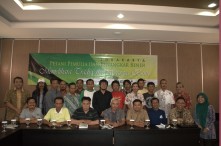Most genetic resources all around the world slowly flow toward many international seeds bank or directly to researcher. International seed corporations predominantly take benefits of the freely available genetic resources and develop it into million dollars-worth of exceptional, hybrid or transgenic seeds. So far, researchers in seeds industry have developed 72,500 new plant varieties or nine times bigger than number of new varieties developed by public institutions. Based on this reality, it can be concluded that the international regulation that was mandated by a pact on ‘benefit sharing’ is not implemented in practice.
On the other hand, many farmers especially in Indonesia who defend genetic resources by breeding and cultivating local seeds as a step toward farmers’ sovereignty on seeds. This is contrary to Indonesian government’s position. From the very beginning, the government have established many instruments that regulate plants breeding, including Law no. 12 Year 1992 on Plant Cultivation System and Law no. 29 Year 2000 on Plants Variety Protection, and Law no. 4 Year 2006 on the promulgation of International Treaty on Plant Genetic Resources for Food and Agriculture. All these regulation and policies are motivated by similar interest that is to provide market for commercial seed corporation, criminalization on farmers who manage seeds system and prohibit farmer from using, exchanging and distributing varieties owned by seed corporations “protected” by PVP Law.
These facts drove API, SPI and WAMTI – as part of MTCP-2 Indonesia platform – to organize Farmer Breeder Workshop, themed “Maintaining Tradition, Nurturing Earth” held on 21 to 23 December 2015 in Hotel Sofyan Jakarta. The activity was attended by 25 farmer breeders, members of Indonesian Peasant Alliance (API), Indonesian Peasant Unions (SPI), At Thariq Ecological Islamic Boarding School in Garut, and IPPHTI.
Its objectives are as follow: First, to understand the impact of many interest factors (economy, social and politic) within seed issues. Second, to collect inputs and informations from experts on International treaties about seeds and models of international treaties on seed resources and the consequences on smallholder farmers. Third, to collect information from the government about policies and programs on protection and empowerment for farmers and seed breeders, and to develop collaboration with farmers. Fourth, to collect inputs from experts about consequences of Law no. 29/2000, Law no. 12/1992 on Plant Cultivation System post judicial review, Law no. 19/2003 on farmers protection and empowerment and its impact on Indonesian farmers’ future. Fifth, to share experience between farmer breeders related to technology, production and challenges. Sixth, to formulate strategy of strengthening farmer breeders’ capacity in facing regulation and policies on plants breeding, in attempts to establish community-based seeds bank and seeds registration.
Firstly held in Indonesia, the workshop was expected to become part of farmers organization fights in promoting various policies and part of measures in fighting for farmers’ sovereignty on seeds. “Currently, farmer breeders face difficult challenges. Those challenges come from agri-corporations which also move around currently ruling government and able to government’s influence policies for their own benefits,” said Henry Saragih, leader of SPI in his opening remarks during the Workshop.
The three days workshop was also expected to help developing network between farmer breeders, especially those who live in Java Island, to build spatial capacity and develop knowledge within community-based seeds learning centre and seeds registration. “There is a huge advantage from the gathering of many experts here, from discussion between farmers that bring us all closer,” said Iwan, farmer breeder member of WAMTI.
Similar thing is expressed by Pandi, farmer breeder member of SPI from Bogor District, who was very happy with his participation within the workshop where he can meet many “professors” in agriculture-related matters, including on fertilizers, seeds etc. Joharipin, farmer breeder member of IPPHTI, also expressed his gladness that knowledge on seeds breeding in Indonesia can be well-developed, and bring benefits for farmers. “Yet, for farmer breeders’ sustainability, it is important to get support from many elements, both from farmer organizations and government,” he concluded.
Similar thinking was also stated by Giono, farmer breeder and leader of API – East Java, that farmer organizations in each region have cadres that develop seeds with their capacities. The workshop is expected to enlarge opportunity for strengthening those capacities. “[Competition] in the future will be even tighter. We will face ASEAN Economic Community, so whether we want it or not, we must face ASEAN free market. We need to strengthen network between farmers, especially among seed breeder farmers,” he added.
Furthermore, the workshop (that was facilitated by M. Nuruddin and M. Rifai of API) emphasized that in organizing seeds cultivaiton, farmer organizations must maintain three principles. They include developing agriculture based on agro-ecology; strengthening and encouraging food sovereignty; and family farming as foundation for food- and seeds-sovereignty. Mr. Nuruddin also added that the workshop was concluded with several agreement that later will strengthen network and capacity of farmer breeders.
“Farmer breeders who participated within the workshop have agreed to develop their capacity through Training on Trainers (ToT), Field School and Technical Assitances; and strengthening advocacy/lobby strategy to anticipate potencial changes in policies and regulation. It will be conducted on every level, locally and nationally. There will also be data collection on seed varieties from different region as database of farmer organization and farmer breeders,” Mr. Nuruddin said. He also maintained that farmer breeders should stay focused within the platform to improve capacity, for the benefits of farmers and their organizations. (FW)


Comments are closed